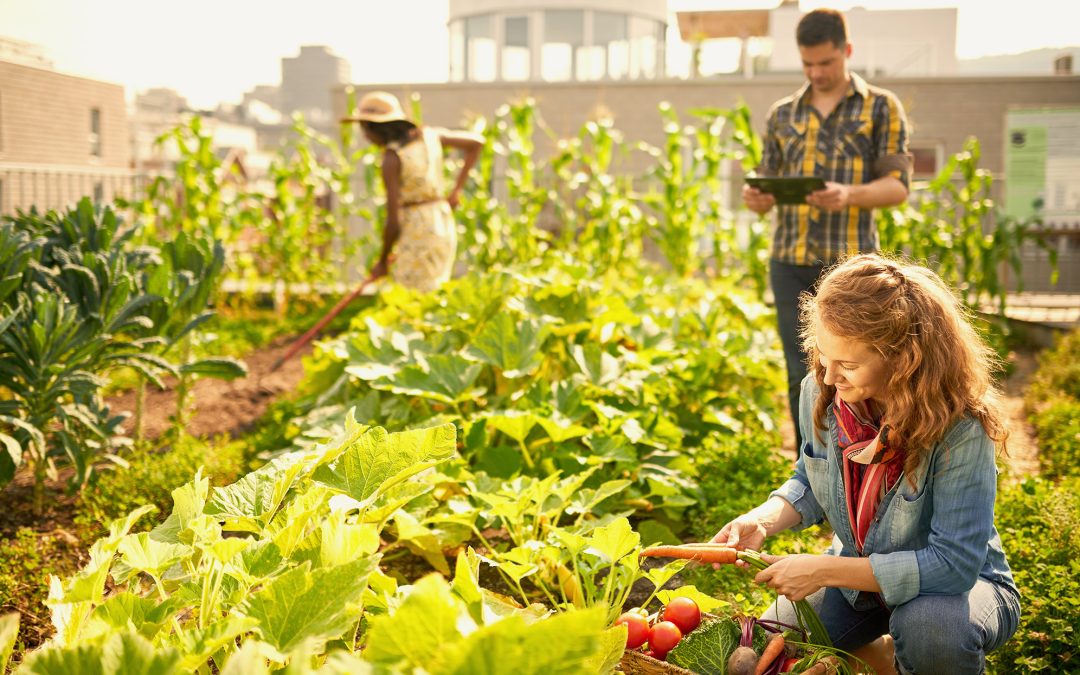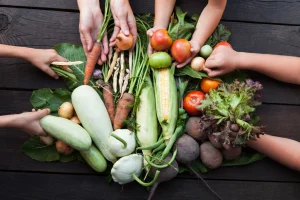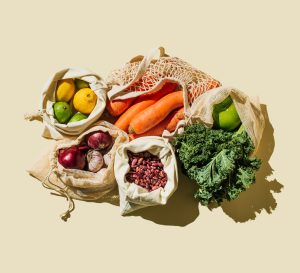Where climate change and resource depletion are pressing issues, food sustainability has become more crucial than ever. “Why is food sustainability important?” It’s about ensuring that future generations can enjoy a stable food supply without damaging the environment. Sustainable practices help us balance the needs of people, the planet, and the economy, making it a key factor in shaping a resilient and healthy future.
Food sustainability is crucial because it ensures long-term food security by promoting practices that protect the environment, conserve resources, and reduce waste. It helps minimize the negative impacts of food production on ecosystems, such as deforestation, soil degradation, and water pollution. Sustainable food systems also support biodiversity and mitigate climate change by reducing greenhouse gas emissions.
Additionally, sustainable food practices promote fair labor, ethical animal treatment, and equitable access to nutritious food for all. By focusing on sustainability, we create a food system that meets current needs without compromising the ability of future generations to meet theirs.
Environmental Benefits of Food Sustainability
Food sustainability offers numerous environmental benefits by promoting practices that minimize harm to ecosystems and help restore natural resources. These benefits can be seen across several key areas:
- Reduction of Greenhouse Gas Emissions: Conventional agriculture is a significant source of greenhouse gases (GHGs) like methane and nitrous oxide, primarily from livestock production, synthetic fertilizers, and fossil fuel usage in farming operations. Sustainable practices, such as organic farming, reduced reliance on chemical inputs, and agroecology, help lower these emissions. Regenerative agriculture, in particular, focuses on capturing carbon in soils through techniques like cover cropping, crop rotation, and reduced tillage.
- Conservation of Water Resources: Unsustainable agricultural practices often lead to excessive water use, pollution of freshwater sources, and depletion of aquifers. Sustainable farming emphasizes water conservation techniques such as drip irrigation, rainwater harvesting, and the cultivation of drought-resistant crops. This ensures that water is used more efficiently, reducing the strain on natural water sources.
- Preservation of Soil Health: Soil degradation, including erosion, compaction, and loss of fertility, is a major consequence of industrial agriculture. Sustainable practices, such as the use of organic fertilizers, crop rotation, and reduced pesticide use, help maintain and improve soil health. Healthy soils can retain nutrients and moisture better, support plant growth, and act as carbon sinks, storing atmospheric carbon dioxide.
- Protection of Biodiversity: Industrial agriculture often leads to monocultures, which reduce biodiversity and harm ecosystems. Sustainable food production encourages polycultures, agroforestry, and the preservation of natural habitats, supporting a wide variety of plant and animal species. Maintaining biodiversity is crucial for ecosystem resilience, pest control, pollination, and overall ecological balance.
- Reduction of Waste and Pollution: Sustainable food systems focus on reducing waste at every level of the supply chain, from production to consumption. Practices such as composting organic waste and using by-products for animal feed minimize landfill use and methane emissions. Moreover, reducing the reliance on chemical pesticides and fertilizers prevents contamination of soil, air, and water bodies, leading to healthier ecosystems and less pollution.
In summary, food sustainability plays a vital role in mitigating climate change, preserving natural resources, and maintaining healthy ecosystems. It offers a more holistic and responsible approach to food production that aligns human activity with environmental conservation.
Why is food sustainability important
Food sustainability is important because it addresses the long-term viability of food systems while balancing the needs of the environment, economy, and society. Its importance is multifaceted, impacting everything from natural resource management to human health and global equity. Below are importance of food sustainability:
- Environmental Protection and Resource Conservation
Sustainable food production minimizes harm to the environment by using methods that reduce pollution, conserve water, protect biodiversity, and maintain healthy ecosystems. Unsustainable practices, such as deforestation for agriculture, overuse of water, and heavy reliance on synthetic fertilizers and pesticides, deplete natural resources.
This leads to soil degradation, loss of biodiversity, and water scarcity. Food sustainability emphasizes practices like crop rotation, organic farming, and regenerative agriculture, which help maintain soil health, reduce the carbon footprint, and promote resource conservation.
For instance, sustainable practices reduce greenhouse gas emissions by minimizing the use of fossil fuels in farming and adopting techniques that capture carbon in the soil. Water-efficient irrigation systems like drip irrigation conserve freshwater, which is critical as agriculture accounts for 70% of global freshwater usage.
- Mitigating Climate Change
The global food system contributes significantly to climate change, responsible for approximately 25-30% of global greenhouse gas emissions. Livestock farming, industrial crop production, and food waste are major contributors to methane and carbon emissions.
Food sustainability efforts, such as promoting plant-based diets, reducing food waste, and adopting climate-smart agricultural techniques, play a critical role in lowering emissions. Practices such as agroforestry (integrating trees with crops and livestock) help sequester carbon, contributing to the fight against global warming.
- Ensuring Food Security and Resilience
Food sustainability is key to ensuring long-term food security, which is the availability of nutritious food for all. With global population growth and increasing demand for food, unsustainable practices could lead to resource depletion and reduced agricultural yields in the future.
Sustainable farming techniques, such as permaculture and organic farming, help ensure that farming systems are resilient to environmental changes, such as droughts and floods, ensuring stable food production even in challenging conditions. By protecting resources and using them efficiently, sustainable food systems help meet current food demands without compromising future generations’ ability to do the same.
- Reducing Food Waste
Food waste is a significant global issue, with approximately one-third of all food produced being lost or wasted. Sustainable food systems aim to reduce this waste by promoting efficient supply chains, better food storage, and consumption habits that minimize excess. Reducing food waste not only prevents wastage of the resources used in food production (land, water, energy) but also helps reduce methane emissions from food decomposing in landfills.
- Promoting Equity and Ethical Practices
Food sustainability also emphasizes social and economic equity. Unsustainable food systems often rely on exploitative labor practices and contribute to economic inequality, particularly in developing countries. Sustainable food systems promote fair labor practices, ensure better livelihoods for farmers, and support local economies by encouraging small-scale, diversified farming.
Moreover, they address the inequitable distribution of food, aiming to make healthy and nutritious food accessible to all communities, including vulnerable populations that may suffer from food insecurity.
- Public Health and Nutrition
Sustainability in food production also contributes to human health by promoting nutritious, diverse, and safe food. Industrial farming, which often focuses on monocultures and heavily processed foods, can lead to poor nutrition and an over-reliance on calorie-dense but nutrient-poor diets.
Sustainable food systems, however, prioritize crop diversity, including fruits, vegetables, legumes, and whole grains, contributing to healthier diets and reducing the prevalence of diet-related diseases like obesity, heart disease, and diabetes.
- Resilience Against Market Shocks
Global food markets are vulnerable to shocks such as economic downturns, pandemics, and geopolitical conflicts. Sustainable, localized food systems are more resilient because they reduce reliance on long global supply chains, which can be disrupted. By encouraging local and regional food production, sustainability improves food security in times of crisis.
Food sustainability is vital for preserving environmental resources, mitigating climate change, ensuring food security, reducing waste, promoting ethical labor practices, and improving human health. Without sustainable practices, the future of food production and global well-being is at risk.
Impact on Human Health
The impact of food sustainability on human health is profound and multifaceted. Sustainable food systems contribute to healthier diets, improved nutrition, and overall well-being. Here is how food sustainability affects human health:
- Improved Nutrition
Sustainable food systems emphasize the production and consumption of diverse, nutrient-rich foods, including fruits, vegetables, whole grains, legumes, and healthy fats. These foods are essential for a balanced diet and help prevent chronic diseases such as obesity, diabetes, and cardiovascular diseases. By promoting local and seasonal produce, sustainable agriculture encourages the consumption of fresh, nutrient-dense foods, leading to better health outcomes.
- Reduction of Chemical Exposure
Conventional farming practices often rely heavily on synthetic pesticides, fertilizers, and herbicides, which can pose health risks to consumers through food contamination. Sustainable farming methods, such as organic farming, limit or eliminate the use of these chemicals, reducing exposure to harmful substances. This not only benefits consumers but also protects farmworkers and surrounding communities from pesticide-related health issues.
- Support for Mental Health
Access to healthy, sustainably produced food can positively affect mental well-being. Diets rich in whole foods have been associated with lower rates of depression and anxiety. Additionally, local food systems that promote community engagement—such as farmers’ markets, community gardens, and food cooperatives—foster social connections, which are crucial for mental health. Being connected to food sources and communities can provide a sense of purpose and belonging.
- Food Security and Accessibility
Sustainable food systems aim to address issues of food insecurity and ensure equitable access to nutritious food for all populations. Food deserts—areas with limited access to affordable, healthy food—can lead to poor dietary choices and associated health problems. By promoting local agriculture and food sovereignty, sustainable practices can help improve food access, leading to better health outcomes for vulnerable communities.
- Climate Resilience and Public Health
The impacts of climate change, such as extreme weather events, heatwaves, and changing agricultural conditions, can directly affect food production and safety. Sustainable food systems are designed to be more resilient to climate change, ensuring a stable food supply and protecting public health. For example, sustainable practices that improve soil health and water management can lead to more reliable crop yields, reducing the risk of food shortages and the associated health crises.
- Promotion of Plant-Based Diets
Sustainable food systems often advocate for plant-based diets, which are not only better for the environment but also beneficial for human health. Research indicates that plant-based diets are linked to lower risks of chronic diseases, such as heart disease, obesity, and certain cancers. By promoting more sustainable and plant-centered eating patterns, we can improve public health outcomes on a larger scale.
- Cultural and Traditional Practices
Sustainable food systems often incorporate traditional agricultural practices and local food culture, which can enhance dietary diversity and preserve culinary heritage. These practices can provide communities with culturally appropriate and nutritious food options, contributing to both physical health and cultural identity.
Food sustainability has a significant positive impact on human health through improved nutrition, reduced chemical exposure, enhanced mental well-being, increased food security, resilience against climate change, promotion of plant-based diets, and preservation of cultural practices. By fostering sustainable food systems, we not only contribute to environmental health but also improve the overall health and well-being of individuals and communities.
Economic Importance
The economic importance of food sustainability is significant, influencing various aspects of the economy, from local communities to global markets. Here are some key points detailing its economic relevance:
- Job Creation and Economic Resilience
Sustainable food systems often rely on local and regional production, which can create jobs in agriculture, processing, distribution, and retail. By supporting small-scale farmers and local businesses, sustainable practices help stimulate local economies and provide stable employment opportunities. These jobs are typically more resilient to economic downturns compared to those in large, industrial food systems, which can be vulnerable to global market fluctuations.
- Reduction of Food Waste and Cost Savings
Sustainable food systems emphasize efficiency and waste reduction at every stage of the food supply chain. By minimizing food waste—currently estimated at one-third of all food produced—economic resources are conserved, which can lead to substantial cost savings for consumers, businesses, and governments. Reducing waste also lowers the costs associated with disposal and environmental cleanup.
- Enhanced Food Security and Stability
Food sustainability promotes practices that increase food security, ensuring that communities have access to nutritious food at stable prices. When food systems are sustainable, they are less susceptible to market shocks caused by climate change, geopolitical conflicts, or global supply chain disruptions. This stability is crucial for maintaining economic resilience and preventing food price volatility that can disproportionately affect low-income households.
- Increased Agricultural Productivity
Sustainable agricultural practices, such as crop rotation, agroecology, and organic farming, can enhance long-term soil health and productivity. Healthy soils lead to better crop yields and reduce the need for costly chemical inputs. By investing in sustainable practices, farmers can improve their productivity and profitability while ensuring the long-term viability of their land.
- Market Opportunities and Consumer Demand
There is a growing consumer demand for sustainably produced food, driven by increased awareness of environmental issues and health concerns. This demand creates new market opportunities for farmers and businesses that adopt sustainable practices. Organic products, local foods, and ethically sourced products often command higher prices, leading to increased revenue for producers. Businesses that focus on sustainability can also differentiate themselves in the market, attracting a loyal customer base.
- Support for Rural Development
Sustainable food systems can revitalize rural economies by promoting local agriculture and food production. Investments in sustainable practices can enhance local infrastructure, such as transportation and processing facilities, leading to further economic development. This helps maintain the vitality of rural communities and can prevent urban migration, ensuring balanced economic growth.
- Long-term Economic Viability
Investing in sustainable food systems is essential for ensuring long-term economic viability. The depletion of natural resources, climate change impacts, and environmental degradation can lead to significant economic costs in the future. By transitioning to sustainable practices, societies can mitigate these risks and foster a more resilient and sustainable economy that supports both current and future generations.
Food sustainability is economically important for creating jobs, reducing waste, enhancing food security, increasing agricultural productivity, tapping into consumer demand, supporting rural development, and ensuring long-term economic viability. By investing in sustainable food systems, we can create a more resilient economy that benefits individuals, communities, and the planet.
How Food Sustainability Tackles Climate Change
Food sustainability plays a crucial role in tackling climate change through various practices and approaches that reduce greenhouse gas emissions, enhance carbon sequestration, and promote resilience in food systems. Here’s how it addresses the climate crisis:
- Reducing Greenhouse Gas Emissions
Conventional agriculture is a significant contributor to greenhouse gas emissions, mainly due to practices such as livestock production, synthetic fertilizer use, and deforestation for farmland. Sustainable agriculture minimizes these emissions by:
- Promoting Plant-Based Diets: Shifting towards plant-based diets reduces the carbon footprint associated with meat and dairy production, which are resource-intensive and generate high emissions.
- Sustainable Livestock Management: Implementing better livestock management practices, such as rotational grazing and improved feeding practices, can reduce methane emissions from enteric fermentation in ruminants.
- Enhancing Carbon Sequestration
Sustainable agricultural practices help sequester carbon in soils and vegetation, mitigating the impact of climate change. This includes:
- Regenerative Agriculture: Techniques such as cover cropping, reduced tillage, and agroforestry enhance soil health and increase organic matter, allowing soils to store more carbon.
- Agroecology: Integrating biodiversity and natural ecosystems into farming systems enhances carbon storage and resilience, as diverse ecosystems are better at sequestering carbon.
- Improving Soil Health
Healthy soils are vital for capturing and storing carbon. Sustainable practices that improve soil health—such as organic farming, crop rotation, and composting—enhance the soil’s ability to absorb carbon dioxide from the atmosphere. Healthy soils also retain moisture better, making crops more resilient to droughts and reducing the need for irrigation.
- Minimizing Food Waste
Food waste is a significant contributor to greenhouse gas emissions. When food is discarded, the resources used in its production (land, water, energy) are wasted, and decomposing food in landfills generates methane, a potent greenhouse gas. Sustainable food systems focus on:
- Reducing Food Waste: Implementing better supply chain management, improving storage facilities, and raising consumer awareness can significantly reduce food waste.
- Repurposing Waste: Sustainable practices promote composting and utilizing food by-products, which can further reduce waste and lower emissions.
- Sustainable Water Management
Water management is critical in agriculture, especially as climate change leads to altered precipitation patterns and water scarcity. Sustainable practices like:
- Efficient Irrigation: Techniques such as drip irrigation reduce water usage, minimizing the energy required for pumping and conserving vital water resources.
- Rainwater Harvesting: Collecting and storing rainwater can reduce reliance on groundwater and improve resilience to droughts.
- Supporting Local and Regional Food Systems
Sustainable food systems often emphasize local and regional food production, reducing the carbon footprint associated with long-distance transportation. By supporting local farms and shortening supply chains, emissions from transportation are minimized, and communities become more resilient to global market fluctuations.
- Promoting Climate-Smart Agriculture
Food sustainability incorporates climate-smart agricultural practices that adapt to changing climatic conditions while reducing emissions. This includes:
- Crop Diversification: Planting a variety of crops can help mitigate risks associated with climate change, such as pests and extreme weather, and can improve overall farm resilience.
- Integrated Pest Management (IPM): Reducing reliance on chemical pesticides through IPM helps protect beneficial organisms and reduces chemical runoff, enhancing ecosystem health.
Food sustainability tackles climate change by reducing greenhouse gas emissions, enhancing carbon sequestration, improving soil health, minimizing food waste, implementing sustainable water management, supporting local food systems, and promoting climate-smart agricultural practices.
Global Food Security and Sustainability
Global food security and sustainability are interlinked concepts that address the challenge of providing sufficient, safe, and nutritious food for the growing global population while ensuring that food systems are resilient and environmentally sound. Here’s an overview of their relationship and significance:
- Understanding Food Security
Food security exists when all individuals have access to sufficient, safe, and nutritious food to maintain a healthy life. It encompasses four key dimensions:
- Availability: Sufficient food production and supply in a region.
- Access: Economic and physical access to food.
- Utilization: Proper use of food, including dietary diversity and nutritional quality.
- Stability: Consistency of food availability and access over time.
- The Role of Sustainability in Food Security
Sustainability is crucial for achieving long-term food security because it addresses the environmental, economic, and social dimensions of food systems. Here’s how sustainability contributes to food security:
- Resource Conservation: Sustainable practices conserve vital resources, such as soil and water, ensuring that food production can continue without depleting these essential inputs. Healthy ecosystems provide the foundation for productive agriculture.
- Climate Resilience: Sustainable food systems are more resilient to climate change, ensuring that communities can adapt to shifting weather patterns, extreme weather events, and changing growing conditions. This resilience is vital for maintaining food availability in the face of climate-related challenges.
- Biodiversity Protection: Biodiverse ecosystems support a wide range of crops and livestock, enhancing food variety and security. Sustainable agricultural practices that promote biodiversity help protect against pests and diseases, improving overall agricultural stability.
- Challenges to Global Food Security
Several challenges threaten global food security, including:
- Population Growth: The world’s population is expected to reach nearly 10 billion by 2050, increasing the demand for food and putting pressure on existing food systems.
- Climate Change: Rising temperatures, altered precipitation patterns, and extreme weather events can disrupt food production and threaten food security.
- Inequitable Access: Economic disparities and social inequalities limit access to food for many people, especially in low-income and marginalized communities. Food deserts—areas with limited access to affordable, healthy food—exacerbate this issue.
- Environmental Degradation: Unsustainable agricultural practices lead to soil degradation, water scarcity, and loss of biodiversity, undermining the capacity to produce food in the long term.
- Sustainable Solutions for Food Security
To achieve global food security, sustainable practices and policies must be implemented across the food system. Some effective strategies include:
- Promoting Sustainable Agriculture: Encouraging practices such as organic farming, agroecology, and regenerative agriculture can increase food production while protecting the environment and natural resources.
- Investing in Technology and Innovation: Advances in agricultural technology, such as precision farming and sustainable aquaculture, can improve yields and reduce resource use. Research and development in sustainable practices are essential for adapting to changing conditions.
- Strengthening Local Food Systems: Supporting local and regional food systems enhances food access, reduces transportation emissions, and fosters community resilience. Initiatives such as community-supported agriculture (CSA) and farmers’ markets promote local food production.
- Improving Infrastructure and Supply Chains: Investing in transportation, storage, and processing facilities helps reduce food loss and waste, ensuring that food reaches consumers efficiently and sustainably.
- Global Cooperation and Policy Frameworks
Achieving global food security and sustainability requires cooperation among governments, organizations, and communities. International frameworks, such as the United Nations Sustainable Development Goals (SDGs), specifically Goal 2, which aims to end hunger, achieve food security, improve nutrition, and promote sustainable agriculture, provide a roadmap for collective action.
Global food security and sustainability are critical for ensuring that all people have access to sufficient, safe, and nutritious food while preserving the environment and resources for future generations. By implementing sustainable practices and policies, addressing the challenges of population growth and climate change, and fostering global cooperation, we can create resilient food systems that support food security and promote a sustainable future for all.
What Can You Do To Sustain Food
Sustaining food systems is a collective effort that requires individual actions and community engagement. Here are several practical steps you can take to contribute to food sustainability:
- Adopt a Plant-Based Diet
- Reduce Meat and Dairy Consumption: Incorporate more plant-based meals into your diet. Even small changes, such as participating in “Meatless Mondays,” can significantly reduce your carbon footprint and resource use.
- Choose Locally Sourced Foods: Support local farmers and markets by purchasing seasonal and local produce, which reduces transportation emissions and supports the local economy.
- Minimize Food Waste
- Plan Meals: Create a weekly meal plan to avoid buying excess food. Use grocery lists to stick to what you need.
- Store Food Properly: Learn proper storage techniques to extend the shelf life of fruits, vegetables, and leftovers.
- Repurpose Leftovers: Get creative with leftovers by using them in new meals or composting food scraps instead of throwing them away.
- Grow Your Own Food
- Start a Garden: Whether it’s a small herb garden on your windowsill or a larger vegetable garden in your backyard, growing your own food reduces reliance on commercial farming and transportation.
- Participate in Community Gardens: Join or support local community gardens, which can foster a sense of community and provide fresh produce.
- Choose Sustainable Products
- Buy Organic and Sustainable Brands: Look for products that are certified organic or labeled as sustainable, which often follow more environmentally friendly practices.
- Support Fair Trade Products: Choose fair trade-certified products to ensure ethical treatment of workers and sustainable farming practices.
- Educate Yourself and Others
- Learn About Food Systems: Educate yourself on the impacts of food production and consumption on the environment and society. Share this knowledge with friends and family.
- Advocate for Change: Support local, national, and global initiatives that promote sustainable food practices and policies. Engage in conversations about food sustainability in your community.
- Practice Sustainable Cooking
- Cook from Scratch: Preparing meals from whole ingredients reduces reliance on processed foods, which often have higher environmental impacts.
- Use Seasonal Ingredients: Focus on cooking with seasonal produce to reduce the environmental footprint associated with out-of-season food transportation.
- Reduce Water and Energy Use
- Be Mindful of Water Use: When cooking, try to use water efficiently and avoid excessive water usage in food preparation.
- Use Energy-Efficient Appliances: Choose energy-efficient appliances and cook in batches to minimize energy consumption.
- Participate in Food Policy Advocacy
- Support Local Farmers: Engage with local agricultural policies that support sustainable practices, such as zoning laws that favor urban agriculture.
- Get Involved in Food Justice Movements: Support initiatives aimed at improving access to healthy food in underserved communities.
- Reduce Packaging Waste
- Use Reusable Bags and Containers: Bring your own bags to the store and use reusable containers for leftovers to minimize single-use plastics.
- Choose Bulk Purchases: Buy in bulk to reduce packaging waste and save money.
- Compost Food Scraps
- Start a Compost Bin: Composting food scraps reduces landfill waste and creates nutrient-rich soil for gardening. Many communities offer composting programs or resources to get started.
Every action counts when it comes to sustaining food systems. By adopting sustainable practices in your diet and daily life, you contribute to a healthier environment and a more equitable food system. Whether through individual choices, community involvement, or advocacy, everyone has the power to make a positive impact on food sustainability.
Conclusion
In this post you will get to know more about Why is food sustainability important? It’s crucial because it ensures that we meet our current nutritional needs without compromising the ability of future generations to do the same. By adopting sustainable practices, we help protect our environment, conserve resources, and support fair economic opportunities for farmers. Embracing food sustainability not only benefits the planet but also fosters a healthier, more resilient food system for all.





